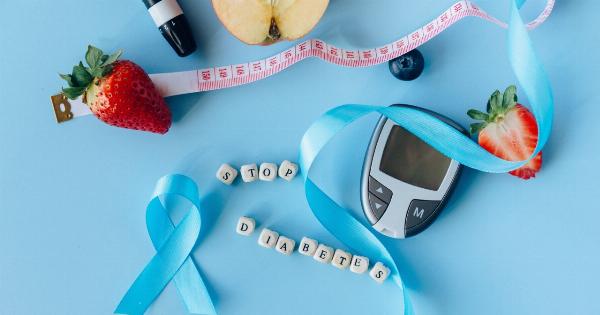Diarrhea is a common digestive problem that can cause discomfort and dehydration.
It is characterized by frequent loose, watery stools, and can be caused by various factors such as infections, food poisoning, medications, or underlying digestive disorders. While over-the-counter medications can help alleviate symptoms, making dietary changes is crucial in managing and treating diarrhea. Certain foods and diets can help normalize bowel movements, replenish lost nutrients, and reduce inflammation.
In this article, we will explore some of the best diets for treating diarrhea.
1. The BRAT Diet
The BRAT diet, which stands for bananas, rice, applesauce, and toast, is a well-known diet for easing digestive distress, including diarrhea. These bland, low-fiber foods are easily digestible and can help solidify stools.
Bananas are particularly helpful as they are rich in potassium, an electrolyte that may be lost during diarrhea. Rice and toast provide easy-to-digest carbohydrates, while applesauce offers natural sugars and fiber.
2. Clear Fluids and Electrolytes
One of the most significant risks associated with diarrhea is dehydration. When experiencing diarrhea, it is essential to maintain hydration levels by drinking clear fluids.
This includes water, clear broths, herbal teas, and electrolyte solutions like sports drinks or oral rehydration solutions. These fluids help replenish lost fluids and electrolytes such as sodium, potassium, and chloride.
3. The GAPS Diet
The GAPS (Gut and Psychology Syndrome) diet is a therapeutic diet that focuses on healing the gut by eliminating certain foods and promoting nutrient-dense options.
While initially designed for addressing gut and neurological conditions, the GAPS diet can also be beneficial for diarrhea. It involves removing grains, processed foods, sugars, and dairy, and focusing on homemade bone broths, well-cooked vegetables, fermented foods, and healthy fats. This diet aims to provide gut-healing substances while avoiding potential triggers.
4. The Low-FODMAP Diet
FODMAPs, which stands for fermentable oligosaccharides, disaccharides, monosaccharides, and polyols, are fermentable carbohydrates that can cause digestive symptoms in some individuals.
Diarrhea can be one of the symptoms associated with FODMAP sensitivity or intolerance. The low-FODMAP diet involves eliminating high-FODMAP foods such as certain fruits, vegetables, grains, and sweeteners for a specific period, then gradually reintroducing them to identify personal triggers.
Following the low-FODMAP diet can help reduce diarrhea and improve overall digestive symptoms.
5. The Specific Carbohydrate Diet (SCD)
The Specific Carbohydrate Diet (SCD) is another diet that can be beneficial for diarrhea management. It is primarily designed for individuals with inflammatory bowel diseases (IBDs) such as Crohn’s disease and ulcerative colitis.
The SCD eliminates complex carbohydrates, disaccharides, and certain fiber sources. Instead, it focuses on easily digestible carbohydrates, lean proteins, healthy fats, and specific fruits and vegetables. By reducing complex carbohydrates and potentially irritating foods, the SCD can help alleviate diarrhea and promote gut healing.
6. Probiotics and Fermented Foods
Probiotics are beneficial bacteria that can help maintain a healthy balance in the gut microbiome. In cases of diarrhea, consuming adequate probiotics can help restore the balance of gut flora and reduce inflammation.
Probiotics can be found in fermented foods such as yogurt, kefir, sauerkraut, kimchi, and kombucha. Additionally, probiotic supplements are available in various forms, including capsules, powders, and liquids. It is essential to choose probiotics specifically targeted for diarrhea relief.
7. Low-Residue Diet
A low-residue diet is often recommended for individuals with diarrhea, particularly if accompanying symptoms include abdominal pain and cramping.
This diet limits high-fiber foods and focuses on low-fiber options such as white bread, refined grains, cooked vegetables without skins or seeds, lean proteins, and well-cooked fruits. This helps reduce the stool volume and frequency, providing relief from diarrhea and associated discomfort.
8. Avoid Trigger Foods
In addition to following specific diets, it is essential to identify trigger foods that may worsen diarrhea.
While trigger foods can vary from person to person, common culprits include spicy foods, fatty foods, caffeine, alcohol, artificial sweeteners, and high-FODMAP foods. It is advisable to keep a food diary and note down any specific foods that worsen symptoms. By avoiding trigger foods, individuals can effectively manage their diarrhea and promote better digestive health.
9. Hydration Tips
Proper hydration is essential during diarrhea, as excessive fluid loss can lead to dehydration. In addition to clear fluids and electrolyte solutions mentioned earlier, there are other hydration tips to consider.
Sipping fluids frequently throughout the day, aiming for at least 8 cups (64 ounces) of fluid intake daily, avoiding caffeine and alcohol that can worsen dehydration, and consuming foods with high water content such as watermelon, cucumbers, and soups can aid in maintaining hydration levels and recovery from diarrhea.
10. When to Seek Medical Attention
While dietary changes can help manage mild cases of diarrhea, it is crucial to seek medical attention if certain signs and symptoms occur.
These include severe or prolonged diarrhea, blood in stools, high fever, dehydration symptoms (excessive thirst, dry mouth, decreased urination), severe abdominal pain, or if diarrhea occurs in infants, young children, or individuals with weakened immune systems. Medical professionals can provide appropriate evaluation and treatment for underlying causes of persistent or severe diarrhea.































